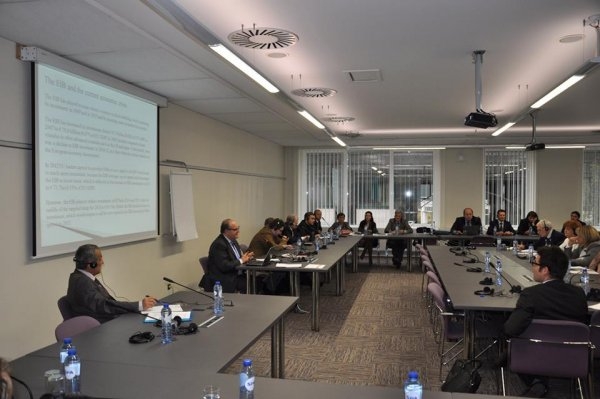FINANCIAL ORGANIZATIONS AND TRADE UNIONS

The PERC, in cooperation with the FGTB, organized a workshop “International Financial Institutions: labour standards in performance standards and opportunities for unions: focus on European Investment Bank” on 4 and 5 November in Brussels.
The workshop aimed at raising awareness of trade union leaders and specialists about environment and social standards of the European Investment Bank and its respective complaint mechanisms, studying experiences of the application of the complaint mechanisms.
Professor Bruno Serghi from the Messina University introduced the role and place of the EIB in the EU and beyond its borders. The EIB is the largest supranational borrower and lender in the world. It was created in 1958 by the Treaty of Rome, is headquartered in Luxembourg and has more than 30 local offices. It is the financing institution of the EU-28 financing over 400 projects per year.
About 10% of its lending goes to projects outside the EU-28 to support the EU policy beyond its borders. The EIB prioritises key projects: climate change mitigation and adaptation, renewable energy, energy efficiency, urban transport , development of social and economic infrastructures, including water and sanitation.
Roberto Rando from the EIB complaint mechanism section presented the work of the complaint mechanism, relations with the European Ombudsman and different methods the EIB was using to improve the situation in the situations when a complaint had been found grounded.
Xavier Sol from the Brussels-based Counterbalance initiative informed about civil society experiences with the complaint mechanism, underlined challenges and areas for improvement and presented several specific cases, including from the region, when civil society organisations were contesting operations co-financed by the EIB.
In open and constructive discussion the participants exchanged views about some challenges existing in the region that can affect the projects, including high risk of corruption, high unemployment and harsh behavior of business interlinked with power circles and the low level of social dialog and respect to the rule of law.
The Confederation of Trade Unions of Armenia was presented by the Head of Educational-research center, Executive secretary of CTUA G.Vagharshakyan. He came up with the suggestion that it is necessary to take into consideration the rating of the organization which is due to be credited and before to finance any organization all related organizations must be provided the information about financing.
It was agreed to continue practical cooperation and exchange of information on different opportunities and possible challenges related to EIB operations in different countries.












